Экономическая теория. Рубрика в журнале - Вестник Пермского университета. Серия: Экономика
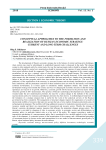
Статья научная
The development of Russia's economic strategy due to the balance of current and long-term challenges, when current ones must be subordinated to established long-term tasks is discussed in the study. The strategy content is often replaced solely by current tasks, the way the macroeconomic policy should be arranged, whether privatization should be carried out, monetization should be increased at the expense of target emissions, and to what extent inflation should be suppressed. These issues being significantly important in the current regime, nevertheless, do not give a strategic vision of what the economic system should become. The current policy instruments that are collectively referred to as strategic programs are broadly discussed. At the same time, the main reasons why the economy is in such a condition have not been analyzed yet. Another issue concerning the failure of the previous programs which have been earlier discussed has not been settled yet. The root of the problems is in the organization of the economy, its structural features and the already introduced new system of basic institutions, and the permanent correction of these institutions does not work for the benefit, even hinders economic development, as it forces agents to relentlessly modify adaptation models. The content of the development strategy must include the essence and ways of changing the economic structure so that this change reproduces new factors of its growth. Otherwise, economic growth will be based on the previous factor model, which the growth of 2017 demonstrates. The specifics of Russia's technological development have already been revealed under the new modernization priorities, the need for a radical change in the methods of the current macroeconomic policy for monetary and budgetary direction has been shown. A methodological framework for the formation of a strategic program that is useful for the work of the analytical services of the Russian government has been considered. The management of structural changes requires the organization of a model of intersectoral mobility of resources that takes into account the task of new markets formation and priority areas of technological development. The mobility will bring additional resources for industrial economic growth as excess resources (capital and labor) are concentrated in transactional and resource sectors. Thereby the strategy of Russia's economy development requires measures that influence the proportion changes among sectors. This interaction is provided by changing of risks in economic activity in economic sectors and differentiations in monetary policy, in particular interest rates as a key tool of the policy. We suggest correcting a model of transmission mechanism of a macroeconomic policy that is considered to be a tactical method to solve strategic tasks of development. A systematic increase in the monetization of the economy and a differentiated percentage of investment projects by sectors are the main prerequisites for a new model of macroeconomic growth policy in Russia, where structural policy becomes the main element.
Бесплатно
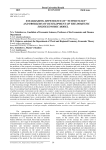
Статья научная
Under the conditions of exacerbation of the crisis, problems of managing cyclic development of the Russian socioeconomic system are gaining special importance as it is necessary not only to level various crisis tendencies, but also to foster accelerated transition of the system to a new stage of development. The article presents the results of research into the conditions of formation of the resource-based model of economic development in Russia, as well as the problems of the economic environment, which has had an impact on the formation and crisis state of the domestic socioeconomic model of development. Basing on the theoretical and methodological analysis conducted, "supercycles" are defined as an undulatory process of industrialization in large countries causing increase in demand for raw materials. The authors'' model of the nature of a modern supercycle is presented, which allows for predicting the main tendencies in the development of technical and economic processes. Dependence of Russia''s participation in the international division of labour on foreign policy factors is substantiated within a historical context. The problems of efficiency of the state participation in economy under the conditions of operation of agreements on production sharing and formation of the anti-crisis programme are considered. It is shown that preservation of the adverse regularity in placement of factors of production and income from them is of stable nature, and in the age of globalization this relation is only becoming stronger. Therefore, for the purposes of economic security, import substitution policy comes to the fore. Introduction of preferences to the practice of profit taxation for the development of production cooperation on the basis of accounting branch profitability is suggested among the key actions. The authors confirm that there is influence of global economic environment on the choice of a country''s model of socioeconomic development. The phenomenon of "resource curse" has to be realized at earlier stages of the development of a society''s socioeconomic model in the developing countries, which play the role of resource suppliers in the international division of labour, lag behind in technological development, have a weak position within international organizations, have no opportunity to influence economic environment and whose financial and currency dependence on the developed countries is rather high.
Бесплатно
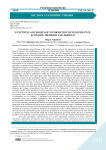
Functions and modes of information development of economy: methods and models
Статья научная
Informatization intensification of the modern economy stresses the importance to discuss the following group of issues: 1) the establishment of criteria and measurement of the effectiveness of the information system; 2) the definition of the information potential of the agent and the assessment of effective information action; 3) information security of the social and economic system. The purpose of the study is to analyze theoretically the functions of various types of information with the determination of the efficiency of information and the modes of economic systems information development. Economic agents are known to search for relevant information that is only a part of total information in the system to make efficient decisions. The action of an agent as well as the development of an economic system is generally characterised with an efficiency coefficient that assesses the opportunity to obtain relevant information. The research methodology is the classification method that allows us to highlight the properties of information, to introduce quantitative indicators for measuring these properties and using mathematical tools to determine possible relationships between them, building theoretical models of the dynamics of information development of economy. Using this approach the functions of information, namely, notification, accumulation, cumulative amplification within the framework of consideration of the informational interaction schemes “object-agent” and “agent-agent” have been determined. The criterion of information potential of the controlled system and the information efficiency coefficient have been introduced. The latter means the ratio of information security to the level of information completeness of the system. Using the analysis of the dynamics of the efficiency and the ratio of relevant and general information, the modes of information development of the controlled system have been determined; three options for the accumulation of information with the ability to quantify the effect that determines the development of the knowledge economy have been suggested. Standard, enhanced and storage accumulations have been shown in the framework of the “object-agent” information interaction model, formal parameters for their quantitative assessment have been introduced. We have proved that one of the goals of economic policy should be the insurance of the necessary regime of information development of the economy, that is aimed at solving problems in the field of information security due to the fact that the functions of information can be violated, i. e. performed with different results, which indicates the dysfunction of the information system and economic management. Such the approach will reduce the depth of dysfunctions of economic policy measures and the application of the information security loop proposed by the author will provide the tool for comparing the damage and benefits from possible information threats, which predetermines the practical application of the conducted theoretical analysis applied to different information modes. Sustainable development of the modern economy should consider the elimination of information threats especially in the context of overcoming opportunism in the form of deliberate distortions of information in order to obtain additional benefits. At the same time, the use of the information security loop for the development of economic policy measures will allow not only to diagnose the damage and benefits within the existing information processing regime, but also to identify the dynamics of the economic system development as a result of changes in the ratio of information benefits and costs.
Бесплатно
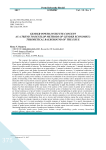
Статья научная
The concept, that analyses economic nature of power relationship between men and women, has been developed on the basis of synthesis of institutional economic theory tools, feminist economics and hierarchical analysis. These power relationships determine the status of men and women in a family and society economy as well as the choice of possible models of behavior. The fundamental issues of the author’s concept are: 1) internal determinacy of dependence of an economic agent-object on an agent-subject; 2) unequal evaluation of resources of a subject and an object of gender power and gender asymmetrical distribution of economic resources; 3) institutional restrictions of hierarchy of gender power distribution are the factor of its reproduction at each level of an economic system; 4) opportunities to realize human capital of men and women are restricted within the limits of institutional roles given by the system of gender power institutes; 5) internal non-coordination of the advanced power disposition reduces the quality of functioning of the whole hierarchical system of gender power institutes and is projected to the level of its interaction with social-economic system in general. The categorical apparatus of feminist economics has been specified and the author has suggested the interpretation of the following categories: gender power, an institute of gender power, institutional role of a subject of gender interaction. The opportunity to apply the postulates of the author’s concept in practice has been demonstrated in the case study of the analysis of the current system of gender power institutes in Russia. The main characteristics of inefficiency of the present system of institutes have been structured. Among them are formal washing out of power borders in macrolevel institutes and strengthening of gender power concentration in microlevel institutes, uniformity of power disposition for subjects, who are at the same hierarchy level, the aims and functions of institutes of different hierarchy level are not coherent, population is not informed enough about forms and facts of gender power manifestation, there are no inverse and horizontal relations among the system elements. The stages to define the strategic imperatives of gender power institutes system of elitist type in modern Russia have been indicated. They are 1) to study peculiarities of possible strategies of institute changes; 2) to specify determinants of quality of gender power institute system; 3) to reveal the nature and to substantiate the importance to change the current system of gender power institutes from the view point of economic agents (men and women); 4) to determine the functioning trajectory and scenario of gender power institutes of elitist type.
Бесплатно
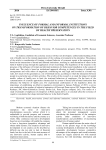
Статья научная
In modern conditions the economic science still has not developed a unified understanding of the role of health care in the rational organization of the working environment in the enterprise. The purpose of the article is consideration of forming a rational behavior of economic agents at the enterprise level based on the interactions of formal and informal institutions, resulting in a transformation of values in the field of health savings through the application of new knowledge. The hypothesis of the research is the presence of the influence of formal and informal institutions for behavioural installation in the system of health care. The study is based on institutional approach, allowing to identify features of institutional arrangements and value orders of magnitude, considering not only legal and recorded in a formal way rules, how much of the agreement as a set of informal norms, according to which the interaction between people in a particular area of their activities. The novelty of the research is to study the impact of mental models culture of health care to limit the irrational behaviour of employees. On the basis of the systematization of scientific approaches characterized by system of formal and informal institutions that influence the behavior of health care. For experimental confirmation of the hypothesis about the importance of establishing an effective regulatory environment in January-February of 2015, a survey was conducted at the number of industrial enterprises of Perm and Perm region (JSC Saranovskaya Mine Rudnaya, JSC Motovilikhinskiye Zavody, Barma Ltd., Perm Engine company Ltd),. The results of a study of attitudes of employees of enterprises in Perm region allow us to conclude about the existence of cognitive constraints that shape irrational behavior in the field of health.
Бесплатно
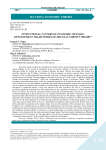
Institutional factors of economic changes: development trajectories of Douglas North's theory
Статья научная
The present article considers the contribution of Douglas North to general institutional economic theory with a special emphasis on the research of institutional factors of economic changes. It has been revealed how agents' interaction models are formed and how institutions influence the agents' behavior and change their models. It is especially important, that D. North's conclusions and their development in modern economic theory result in the emergence of the so-called institutional macroeconomics and being a scientific discipline it explains economic changes on long intervals of evolution. The main emphasis in the article is put on two D. North's works: “Institutions, Institutional Changes and Economic Performance” (1990) and “Understanding the Process of Economic Change” (2005). The advantages and possible disadvantages of the new institutional approach by D. North that is devoted to a long interval of social evolution have been demonstrated. In particular the formal informal institutions relations have been discussed as well as compulsion mechanisms that according to D. North belong to special institutions that play a significant role in the description of institutional changes at long time intervals have been considered. The role of a government and government regulation mechanisms have been studied based on the compulsion mechanisms to observe the rules and norms in economy. We study the connection between transaction and transformation costs that are conventionally considered independently in the frameworks of a new modern institutionalism. The authors' attitude to technologies as special and rather stable institutions at particular time periods has been proven. This attitude is opposite to the view that institutions and technologies are interconnection factors of institutional changes according to D. North. From the authors' point of view the model approach by D. North provides restricted representation of institutional changes of complex social and economic model. Moreover, there is a redistribution of weights of change factors and D. North's theory is not able to determine the regularities in the weights change. In its turn the introduction of the trust factor by G. Akerlof andR. Shiller is not a sufficient decision as different social institutions have macroeconomic importance. These institutions predetermine economy development and trust forms that are formed between some agents. For example, technologies are such institutions and processability of economy as a system predetermines its economic dynamics and demand for the change of some institutions into the others-institutional changes regime. Thus the task under consideration is difficult and has not been solved in economics yet. The opportunity to solve the above mentioned challenges using the postulates of “institutional macroeconomics” as the scientific analysis branch has been founded.
Бесплатно
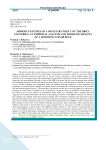
Статья научная
The article is devoted to modern issues of a monetary policy of the BRICS countries. Currently under the fragile economic situation the role of central banks is increasing; governments search for some new effective methods to stimulate economic growth. One of the key factors of progress is price stability support that is connected with a monetary policy and implementation of an inflation targeting. Nowadays this monetary policy framework has been adopted officially by most of the BRICS countries, but the issues concerning what methods and instruments should be used are still being discussed. The key issue of the discussion is whether it is necessary to set a flexible exchange rate arrangement under the inflation targeting conditions. In this connection, the expediency of a central bank to manage the national currency exchange rate is being discussed as it may conflict with the declared monetary policy. The main task of the present research is to assess the impact of a real effective exchange rate index that is considered to be an element of a monetary policy of the BRICS Central banks on a base interest rate. For this purpose an econometric model based on a modified Taylor's equation has been suggested. This model demonstrates the needs of developing economies of the BRICS countries for both price and exchange rate stability. Panel data analysis together with econometric modeling tools have been used to calculate the empirical part of the study. Regression coefficient assessments have proven the significance of these tools; the econometric modeling results have confirmed that Central banks of the BRICS countries mostly direct their attention to basis tools of the inflation targeting and economic agent expectations when achieving price stability. In the terms of the obtained data we may conclude, that it is necessary to consider an exchange rate when implementing a monetary policy in the BRICS countries. Further we will research 1) monetary policy in each of the BRICS countries in detail and will reveal long-terms connections among indices in the reaction equation of a central bank using co-integration vectors in a vector model of error correction; 2) interference of the policy of the BRICS Central banks and whether they are subject to globalization in the world finance sphere.
Бесплатно
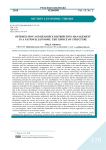
Optimization and resource distribution management in a national economy: the choice of structure
Статья научная
The purpose of the research is to develop resource management tools aimed to appropriately distribute the resources and to justify the ways for copying with the structure choice problem as regards the Schumpeterian approach to the economic development. The methodology of the research includes the Schumpeterian economic growth model, structural analysis, and conventional optimization methods, in particular the gradient projection method which gives alternatives for optimization task solution algorithms. These methods are applied to show the structures with the maximum profit and minimum risk in resource distribution in the national economy, which underlies the resource distribution management task. A model of interaction between the old and new combinations which are officially provided as investments into the old and cutting edge technologies was proposed within the Schumpeterian economic growth model. The economy restructuring was defined as the evolutionary changes of its structure under Joseph Schumpeter's theory, and the modes of the economic dynamics were identified from the correlation between the effects of creative destruction and combinatorial augmentation. The article describes the results of the optimizational simulation which prove that the Schumpeterian economy restructuring provides the prerequisites for new combinations which enhance the possibilities for their own development and for the development of the old combinations. The correlation between the profit and risk rates or expert decisions could become a criterion for decision making at a characteristic point. This fundamentally improves the quality of the managerial decision justification at different levels of an economic body which faces structural tasks of resource distribution. A structural choice problem together with its solution makes the priority task in the economic development of the managed system relevant. The research concludes that the structural policy is an essential element in the strategy aimed to develop a new model of the economic development of Russia, because, in fact, institutional changes and measures taken to create the business environment with no restructuring of the sectorial economic proportions look like the palliative aid with no prerequisites for the new type of economic growth. The research is seen to be promising in finding the particular solutions for resource distribution among the sectors and activity types according to the target functions of the economic system development. What is more, this issue updates the task to identify the impact of new combinations on the exising combinations, as well as to examine the factors which determine this impact. It would also be relevant to find the characteristic points of resource distribution for the particular tasks in the management of the national economy, e.g. state programs, which would enable the stakeholders to develop qualitative (expert) approaches to justify the resources distribution in an economic system.
Бесплатно
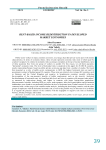
Rent-based income redistribution in developed market economies
Статья научная
Public-sector workers in many countries earn more, on average, than their private-sector peers with similar characteristics. In terms of economic theory, these rewards represent economic rents most of which paid by a nation’s taxpayers. In contrast to economic rents accruing to recipients at the top of income distribution, most of these payments flow from one group of workers to another. For this reason, we call these payments “horizontal” economic rents. The level of horizontal rents is analyzed in this paper for 28 OECD countries, mostly representing Europe, based on public-private sector pay gap data from a number of studies. We found that measured as a ratio of public-sector overpayments to GDP, the highest horizontal rents are paid to government workers in Mediterranean EU countries. These rents are relatively low in larger EU countries, such as Germany and the United Kingdom and negative in Scandinavian countries, possibly reflecting the recognition of the non-monetary benefits of public employment, such as job security. Analyzing the determinants of horizontal rents, we found that their levels are lower in countries with stronger trade unions, as measured by trade-unions density and higher in countries with larger foreign-born populations. Macroeconomic variables, including GDP per capita, trade openness, labor force participation and government indebtedness were found to not measurably influence the level of horizontal rents. Further research is seen to be connected with a wider range of the countries under analysis, including the developing countries, and the other groups of employees with the horizontal economic rent, as well as the possible ways to decrease or to invalidate it as regards the practices analysis of the countries with the negligible or negative rent such as Denmark, Norway, Sweden, Portugal, and Iceland.
Бесплатно
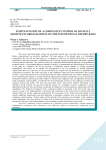
Статья научная
The issues concerning public welfare and sustainable growth that is possible when economic agents behave conscientiously are currently significant. The main purpose of the present study is to substantiate economically the role and the main points of a compliance control as an institute which aim is to reduce stakeholder's risks and to provide a sustainable growth of socially significant organisations that make a national economy function efficiently. The research is based on a theoretical methodological apparatus of an institutional economic theory, a risk-oriented approach, methods of analysis, systematization and generalization. The novelty of the study is a different view on the concept “a compliance control institute of socially significant organisations” that allows us to estimate the consequences of the low breaking by socially significant organisations that occur in the form of costs growth and risks of agents who are interested in a sustainable and conscientious transaction. The trends and types of the compliance control have been determined. These trends consider a social and economic role of organisations that are being controlled and areas where compliance risks arise. Considering the features of socially significant organisations and their classification we have characterised institutional relations, determined possible conflicts of interest and compliance risks, distinguished the functions of the compliance control institute, revealed the role of an institutional structure of the compliance at three levels (internal, external and public). We have also discovered factors that prevent efficient functioning of the institution. In our research we have proven that the institute of a compliance control is significant to reduce opportunistic behaviour risks that threaten sustainable development of socially significant organisations and their stakeholders. The efficient development of the compliance institute is connected to the need of the state and society to assist in the implementation of functions and mechanism of the enforcement to internal audit and internal control by socially significant organisations. The assessment of the control procedure quality by the socially significant organisations and their opposition to legislation violation risks are also important for the compliance control institute. Further studies will be devoted to the construction of a hierarchy of the compliance control institution with a clear division of control tasks at internal and external levels. Also a set of solutions to increase the efficiency of the implementation of the compliance control functionality will be made.
Бесплатно
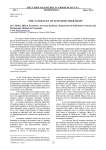
The nanolevel of economic hierarchy
Статья научная
The range of issues related to an individual is crucial for modern economics. It is possible to talk about appearance of nanoeconomics as a new branch along with the traditional micro- and macroeconomic theories. The main objective of the research is to analyze the achievements of various scientific schools concerning nanoeconomics. In the research methods of historical and comparative analyses are used. As for the novelty of the work, the issues of nanoeco-nomics are considered here in terms of hierarchical analysis. Behavioral economics denies the idea of economic agents rationality; evolutionism is based on bounded rationality; neoinstitutionalism and ethical economics preserve the concept of rationality in the theory developing criteria for rationality of higher orders (metarationality). Evolutionism rejects neoclassical economics and suggests a new paradigm; behavioral economics criticizes the axiom of rationality, but it is still not clear what changes into the theory it entails; neoinstitutionalism broadens and deepens the neoclassical theory maintaining its core; ethical economics develops the neoclassical model as its own special case. Neoinstitutionalism is like economic imperialism that tries to extend the methods of economic analysis on issues of other fields such as sociology. Behavioral economics is, rather, expansion of psychology into economics; evolutionary theory - biology expansion into economics; ethical economics - ethics expansion into economics.
Бесплатно
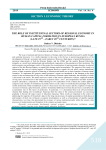
Статья научная
The issue of national and historical features of human capital was broadly discussed by public thought and academic discourse. It is vitally important in the sense to be the key to perceiving perspectives of the development of Russia’s economic and social institutions. Moreover, high degree of spatial differentiation is a persistent characteristic of both the Russian Empire, and the USSR, and the modern Russian Federation, primarily as a result from multinational and multicultural composition of the population of their territories. The article presents our preliminary results of the project for reconstruction of macroeconomic dynamics in selected regions of the late Russian Empire, as regards their human capital accumulation. The purpose of this study is to demonstrate the cases of selected regions of European Russia as regards the role which various institutional sectors of their economies played in financing of education and health care as basic branches of human capital formation. To implement this purpose annual governors’ reports are introduced to the literature as the main source for the reconstruction of long series of the indicators of human capital industries, the reliability of which is discussed in the article. The author used cross-check of the sources quantitative evidence, employed methods of long series reconstruction of the indicators in question (inter-, retro-, and extrapolation) and their statistical analysis (descriptive, comparative). When offering his own explanation of the evidence the author applied to categories and concepts of institutional economic history in the context of modernization paradigm. The first results demonstrate which institutional sectors to what extent were the sources and the recipients of financial resources for human capital formation, and how institutional differences between the provinces could affect the accumulation rate of this factor of production. In particular, it is documented that local self-governments retained their leading role in healthcare financing while the share of the central government was increasing gradually to become the major source of education financing. These results are important in the context of addressing the inquiries of the period’s place in the long run processes of capital accumulation (both physical and human); of their role in Russia’s economic development; as well as of persistence of specific regional characteristics over time, that determined the existence of various institutional paths within the country-wide processes of modernization and formation of the common economic space.
Бесплатно
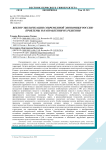
Вектор экологизации современной экономики России: проблемы и направления их решения
Статья научная
Рассматривается один из наиболее актуальных вопросов современности - экологизация экономики, которую следует считать одним из условий устойчивого социально-экономического развития территорий. Острота проблемы загрязнения окружающей среды заключается в существенных негативных последствиях для мировой экономики в случае дальнейшего игнорирования экологической составляющей. В связи с этим целью статьи является определение вектора экологизации современной экономики России в ракурсе обоснования направлений совершенствования экологической политики. Методическую основу исследования составили общенаучные методы (логический, системный подходы, структурно-функциональный анализ, метод обобщения и синтеза), статистические, в т.ч. графические и табличные приемы визуализации данных. В работе представлены основные подходы к определению сущности экологизации экономики; исследованы особенности управления данным процессом на уровне хозяйствующих субъектов и национальной экономики в целом, проведен анализ возможностей применения зарубежного опыта в совершенствовании экологической политики России. Оценка основных тенденций участия бизнеса в решении вопросов экологического развития позволила идентифицировать последствия неэффективной экологической политики хозяйствующих субъектов в РФ: рост объемов выбросов загрязняющих веществ в атмосферу, сброс загрязняющих веществ в водные объекты при одновременном снижении затрат на природоохранную деятельность. В качестве мер повышения эффективности экологизации экономики России обосновывается необходимость использования предприятиями экологически безопасных, энерго- и ресурсосберегающих технологий, экологически ориентированных инноваций; внедрения концепции «наилучших доступных технологий», системы экологического менеджмента и экологического аудита. Особое внимание уделено проблеме перехода на принципы «зеленой» экономики, реализация которых связана с социально-экологической ответственностью бизнеса, базирующейся на постулатах концепции устойчивого развития. Практическая значимость заключается в возможности использования полученных результатов органами власти и бизнес-структурами для определения форм, методов и инструментов формирования и преобразования действующей экологической политики России. Перспективы дальнейших исследований авторов составляют разработка инструментария внедрения принципов «зеленой» экономики с оценкой экономических преимуществ и потерь от такого внедрения, а также изучение путей совершенствования экологического законодательства в РФ, а также исследование и обобщение зарубежной практики экологического аудита деятельности бизнес-структур.
Бесплатно
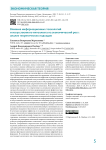
Статья научная
Введение. Статья посвящена анализу влияния информационных технологий и искусственного интеллекта на экономический рост. Несмотря на очевидный потенциал новых технологий, с середины 2000-х гг. в развитых странах наблюдается замедление темпов экономического роста одновременно с ростом расходов на исследования и разработки. Отмечается замедление динамизма рынков, что выражается в снижении коэффициентов входа и выхода фирм и мобильности работников. Цель. Проанализировать современные исследования, объясняющие отсутствие ощутимых макроэкономических эффектов от распространения информационных технологий и искусственного интеллекта. Материалы и методы. Проведены критический анализ и обсуждение академической литературы, посвященной макроэкономическим эффектам информационных технологий и искусственного интеллекта. Результаты. Анализ литературы показал, что современные исследования предлагают несколько объяснений отсутствия макроэкономических эффектов от распространения информационных технологий и искусственного интеллекта. Выявлены исследования, связывающие рост рыночной власти и снижение динамизма с сокращением возможностей для фирм догонять лидеров, что обусловлено особенностями информационных технологий и искусственного интеллекта, такими как замедление распространения знаний и рост значения нематериальных активов. Среди других потенциальных причин отсутствия влияния информационных технологий и искусственного интеллекта на экономический рост упоминаются: а) завышенные ожидания относительно их влияния на производительность, б) неточное измерение эффектов от их воздействия, в) использование новых технологий для перераспределения имеющейся ренты, а не для создания новой добавленной стоимости, г) лаги внедрения и реструктуризации, связанные с необходимостью дополнительных инвестиций и времени для интеграции технологий широкого назначения, к которым относятся информационные технологии и искусственный интеллект. Выводы. Современные теоретические модели предполагают, что замедление динамизма и усиление рыночной власти могут быть связаны с распространением информационных технологий. Соответственно работа может быть полезна исследователям и экономистам, интересующимся факторами экономического роста в условиях цифровой трансформации. В заключение приведены перспективные приложения искусственного интеллекта для стимулирования экономического роста.
Бесплатно
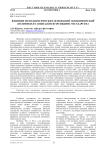
Влияние методологических оснований экономической политики на социальную функцию государства
Статья научная
Проблема участия современных государств в определенном регулировании национальных экономик является сегодня дискуссионной. Большинство развитых стран и международных институтов сегодня придерживаются неолиберального подхода, признающего за свободным рынком ведущую роль в регулировании экономических отношений. Такой подход синтезирует современные достижения неолиберальной и неоинституциональной экономических теорий. Основным документом, концентрирующим в себе эти идеи, является так называемый «Вашингтонский консенсус», положения которого, несмотря на критику, продолжают во многом оказывать влияние на политику развивающихся государств. Проводится анализ теорий и концепций, которые составляют его фундамент и в итоге обосновывают сложившийся мировой экономический порядок. Целью было показать, что методологическая установка, искажающая и упрощающая экономическую реальность в угоду немногим заинтересованным странам и международным институтам, может иметь тяжелые последствия для социальной политики государства. Показано, что каждая из анализируемых экономических теорий в качестве отправной точки рассуждений имеет определенное, обобщенное представление о природе человека, его потребностях и способе существования. Рыночный фундаментализм упорно навязывает мировому сообществу представление о человеке как о homo economicus, что предполагает существенное ограничение экономической и социальной функций государства. Сегодня существует угроза разрушения важнейших социальных институтов, которые создавались в конце XIX в. при активном участии государства: образование, здравоохранение, социальное обеспечение. Свою несостоятельность неолиберальная политика продемонстрировала в России в 90-е гг. во время реформ. Мировому сообществу наша страна дала урок исключительной важности: капитализм, не ограниченный понятным и одинаковым для всех законом и не сдерживаемый государством, превращается в источник глубочайших социальных потрясений. Сегодня задача состоит в том, чтобы признать неспособность рыночной экономики подменять собой социальные функции государства и устроить таким образом экономический порядок, чтобы были созданы условия для свободного развития способностей человека. Данная статья может быть интересна представителям органов государственной власти, политикам, ученым, а также студентам, изучающим историю экономической мысли.
Бесплатно
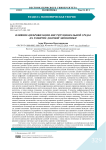
Влияние цифровизации институциональной среды на развитие долевой экономики
Статья научная
Распространение долевой экономики и рост интереса к данной концепции вызван трансформацией моделей ведения бизнеса, что обусловлено перераспределением значимости экономических, социальных и экологических целей потребителей, производителей и поставщиков товаров и услуг. Особое значение приобретают институциональные факторы ведения бизнеса. Вместе с тем активное внедрение цифровых технологий стало катализатором трансформации норм и правил, лежащих в основе трансакций между экономическими агентами различных уровней. Целью данного исследования является определение влияния процесса цифровизации институциональной среды на развитие долевой экономики как основы для ее дальнейшего регулирования. Новизна исследования состоит в выявлении закономерностей развития долевой экономики в условиях цифровизации институциональной среды. В статье охарактеризованы различные аспекты изучения долевой экономики, раскрыты узкая и широкая трактовки исследуемой категории, основанные на том, что долевая экономика является частью цифровой и платформенной экономики. Показано, что понятие долевой экономики связано с дефинициями «экономика доступа», «платформенная экономика» и «экономика, основанная на сообществах». Идентифицировано два ключевых подхода к изучению долевой экономики - технологический, акцентирующий внимание на развитии долевой экономики посредством внедрения цифровых технологий, и социально-экономический, предполагающий трансформацию правил и норм, регулирующих взаимодействие экономических агентов в данной модели. Методом корреляционно-регрессионного анализа проведена проверка гипотез о влиянии факторов цифровизации институциональной среды, характеризующих неформальные и формальные институты, а также сетевые отношения, на развитие долевой экономики. В качестве информационной базы исследования выступили The European Index of Digital Entrepreneurship Systems (EIDES) и The Timbro Sharing Economy Index. В ходе исследования получена нелинейная регрессионная модель, показывающая значимость и характер влияния развития сетевых отношений и социальных медиа на долевую экономику. Гипотезы о влиянии цифрового компонента формальных и неформальных институтов были опровергнуты. Обоснована необходимость развития инклюзивных институтов регулирования долевой экономики, что будет стимулировать решение социальных, экономических и экологических задач в обществе. Теоретическая значимость исследования состоит в расширении положений экономической теории в области исследования трансформации социально-экономических отношений при изменении внешних и внутренних условий и развитии институциональной среды долевой экономики. Практическая значимость заключается в возможности использования выводов и рекомендаций исследования для разработки и совершенствования политики регулирования долевой экономики на макро-, мезо- и микроуровнях экономики. Полученные в исследовании результаты могут представлять интерес для специалистов, изучающих вопросы трансформации экономических отношений и проблемы формирования и развития долевой экономики. Дальнейшие направления исследования будут касаться непосредственно вопросов институционального проектирования долевой экономики, а также анализа потенциала ее применения для решения социально значимых задач на различных уровнях хозяйствования.
Бесплатно
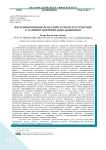
Внутрифирменный феодализм и риски его усиления в условиях цифровизации экономики
Статья научная
Создание оптимальной иерархической структуры управления, обеспечивающей эффективное и устойчивое функционирование фирмы, актуализируется в условиях постоянно изменяющейся внешней среды. Все чаще внимание исследователей обращается на важность неформальных правил, определяющих характер внутрифирменных отношений. В данной статье предпринята попытка дать теоретическое обоснование применимости категорий феодализма к анализу иерархической структуры управления современной промышленной фирмы, а также определить пути преодоления негативных последствий внутрифирменного феодализма. Методологической основой исследования являются положения всеобщей организационной науки А.А. Богданова. В статье обосновывается существование внутри фирмы такой системы отношений, которая фактически согласуется с сущностными характеристиками феодальных отношений. Данная система неформальных отношений влияет на принимаемые управленческие решения, определяет характер и цели деятельности структурных подразделений промышленной фирмы. Обосновывается, что именно характер таких неформальных отношений определяет жизнеспособность фирмы в долгосрочной перспективе. Рассматривается процесс получения внутрифирменными подразделениями элементов квазифеодальной власти через соуправление функциональными уровнями фирмы - физическим (контроль над основными средствами производства), распределительным (контроль над материальными, трудовыми и энергетическими ресурсами), экономическим (влияние на денежные потоки) и проектно-технологическим (влияние на стратегическое развитие и технологии фирмы). Главной причиной внутрифирменного феодализма является расхождение интересов руководства фирмы и работников, что, в свою очередь, вызвано разной длительностью обращения их главных активов -основных средств производства и труда. Констатируется, что необходимым условием для формирования внутрифирменного феодализма является асимметрия информации, свойственная любой иерархической структуре. Внутрифирменная феодализация усиливается в тот момент, когда отдельный работник и подразделение начинают приобретать специфический «капитал» в виде опыта, знаний технологии производства, связей с коллегами и внешними субъектами и т. п. Обосновано, что в условиях цифровизации экономики изменяется состав и структура полномочий «феодалов», при этом масштабы проявления внутрифирменного феодализма не снижаются. Для противодействия процессам феодализации фирмы предлагается использовать такие меры, как удаление «феодалов» и разрушение «феодов», перераспределение проектно-технологических прав от «феодалов» к коллективу сотрудников, размытие полномочий «феодалов», воздействие на условия функционирования «феодов», изменение иерархичной структуры фирмы. Подчеркивается, что возможность ограничения формирования внутрифирменного феодализма обеспечивается созданием нового внутрифирменного субъекта - общего совета рядовых сотрудников фирмы, наделенного проектно-технологическими правами, уровень которых обратно пропорционален уровню прав внутрифирменных «феодалов». Соответственно рост уровня правомочности сотрудников фирмы обеспечит ограничение власти внутрифирменных феодалов. Дальнейшие перспективы исследования связаны с апробацией гипотезы о формировании внутрифирменного феодализма в условиях конкретных промышленных фирм.
Бесплатно
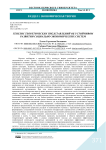
Генезис теоретических представлений об устойчивом развитии социально-экономических систем
Статья научная
Научное сообщество с середины XX в. исследует вопрос устойчивого развития социальноэкономических систем. Термин “sustainable development” впервые появился в зарубежной литературе и подвергается активной критике, а также вызывает затруднения в части перевода и трактовки понятий «устойчивость» и «развитие». Противоречия в научном сообществе и необходимость уточнения сущности данной категории, вызванная приоритетностью антропогенного фактора, обусловливают актуальность проведения теоретических исследований. Целью исследования является систематизация теоретических концепций устойчивого развития, развиваемых на основе постулатов системного подхода, кластерной парадигмы и принципов корпоративной социальной ответственности. Новизна исследования заключается в дополнении общепринятой классификации подходов к изучению проблем устойчивого развития (эколого-системный, триединый, кластерный, корпоративный) положениями концепции корпоративной социальной ответственности. Раскрыты особенности и отличия интерпретации предмета исследования в рамках каждого подхода. По результатам анализа установлено, что на современном этапе не существует общепризнанного определения термина «устойчивое развитие», а в зарубежной и отечественной литературе возникают новые направления его трактования. В ходе проведенного обзора литературы установлено, что часть современных работ посвящена исследованию проблем устойчивого развития в контексте экологической, социальной и экономической составляющих. При этом эколого-системный, триединый, корпоративный подходы применяются для обозначения норм и правил развития социально-экономических систем, кластерный подход и подход корпоративной социальной ответственности являются инструментами реализации концепции устойчивого развития в практике хозяйствующих субъектов. Отмечено, что внедрение подхода корпоративной социальной ответственности во все бизнес-процессы позволит предприятиям повысить устойчивость и адаптивность к воздействию внешней среды с наименьшими затратами. Предлагается использовать принципы подхода корпоративной социальной ответственности для моделирования параметров устойчивости мировой экономики и поиска решения проблем, вызванных глобализацией и научно-техническим прогрессом. Выдвинуто предположение, что эколого-ориентированное мировоззрение общества, включающее в себя нормы и ценности сбережения природных ресурсов и взаимодействия человека с окружающей средой, обеспечит формирование согласованной позиции в отношении интерпретации терминологии устойчивого развития, а также способствует достижению его целей. Дальнейшие исследования рекомендуется сфокусировать в области разработки новых и совершенствования существующих методов и механизмов устойчивого развития экономики в целом. А также необходимо проводить исследования в области применения концепции четырехмерного критерия (QBL) в рамках корпоративного подхода для повышения эффективности хозяйственной деятельности конкретных предприятий за счет определения эффективного сочетания экономических, социальных, экологических и управленческих факторов развития экономики
Бесплатно
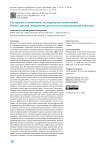
Статья научная
Введение. Статья представляет собой анализ взаимосвязи бизнес-циклов и экономического роста, проводится обзор эволюции этого вопроса от традиционного отрицания связи до альтернативной концепции, известной как гистерезис. Основное внимание уделяется рассмотрению решений в области экономической политики, способных эффективно противостоять структурным изменениям, вызванным рецессией. Необходимо подчеркнуть, что изучение гистерезиса остается весьма актуальным, поскольку учет данного механизма может являться ключевым элементом при формировании стратегий эффективной макроэкономической политики, которые, в свою очередь, направлены на преодоление структурных препятствий и стимулирование устойчивого роста в экономике.
Бесплатно
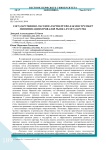
Государственно-частное партнерство как инструмент минимизации провалов рынка и государства
Статья научная
В современной экономике проблемы, порождаемые несовершенством рыночного механизма, как правило, решаются путём государственного вмешательства. Однако деятельность государства не всегда повышает эффективность использования ограниченных ресурсов. В результате возникает ситуация, когда регулирование провалов рынка сопровождается «фиаско» государства. На сегодняшний день в бюджетной системе Российской Федерации усиливаются негативные тенденции фундаментального и конъюнктурного характера: сохранение сырьевой направленности экспортных операций, значительное ослабление курса российской валюты по отношению к иностранным валютам, стремительное снижение мировых цен на нефть, введение секторальных санкций. Структурные изменения в отечественной экономике 2014 г. оказали влияние на рост инфляции, снижение потребительского спроса и реальных доходов населения, что привело к увеличению нагрузки на бюджеты всех уровней. При этом имеется ряд важных инфраструктурных, социальных и других проектов, реализация которых должна осуществляться за счет бюджетных средств с целью удовлетворения потребностей населения. В сложившихся обстоятельствах решение задачи элиминации или минимизации провалов рынка и государства приобретает особую актуальность для экономики России. Мировой опыт показывает, что обеспечить реализацию социально значимых проектов, снижая бюджетную нагрузку, а также повысить инвестиционную активность предпринимательских структур возможно на основе механизмов государственно-частного партнерства. С учетом формирующейся сегодня нормативно-правовой базы регулирования данных отношений возможности практической реализации государственно-частного партнерства в России, его преимущества и ограничения активно обсуждаются в законодательных и деловых кругах. В статье предлагается механизм минимизации провалов рынка и государства в процессе реализации проектов на принципах государственно-частного партнерства. На теоретическом модельном примере с использованием инструментария микроэкономики обоснована эффективность государственно-частного партнерства в производстве общественных благ. В качестве практической иллюстрации разработанного механизма предложен проект строительства поликлиники в г. Перми, позволивший продемонстрировать как возможности государственно-частного партнерства в решении задачи минимизации провалов рынка и государства, так и эффективность реализации проекта для публичного и частного партнера. Результаты анализа дополнены систематизацией экономических и правовых рисков, включающей их распределение между субъектами государственно-частного партнерства, а также способы минимизации. Предложенный инструментарий сглаживания провалов рынка и государства может быть использован органами государственной власти Пермского края для совершенствования практики государственно-частного партнерства в регионе.
Бесплатно

